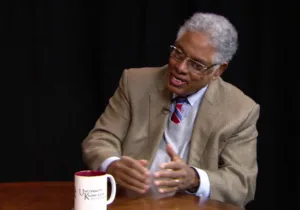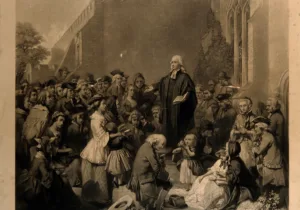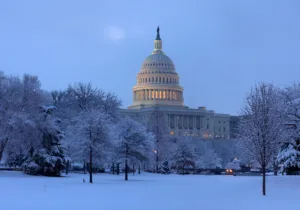Though most humans have a strong aversion to conflict, well-managed debate between competing factions can be beneficial by clarifying truths and settling contentious questions. Sadly, the partisan conflicts that currently grip our nation are not particularly healthy. The feud between Democrats and Republicans obscures the much deeper divide that rests beneath the surface of all policy debates: whether Americans will prioritize technocratic efficiency over democratic self-rule. As boring and procedural as this question may seem, it cuts to the very core of our humanity. And, for the sake of all civilization, it is imperative that we side with democracy.
Regimes are determined by two factors – the motivating ideas of the nation and the political institutions that instantiate those ideas. Though a relatively new regime type, technocracy is an increasingly prevalent and entrenched form of government. Its motivating idea is a simple one: to bring material prosperity to the people, as fast as is humanly possible. Though this sounds slightly decadent, it is usually driven by a high-minded materialism perhaps best exemplified by the “effective altruism” movement. Technocrats believe there is no higher meaning to the universe and, as a result, see the best possible human experience as a materially comfortable life. In short, technocracy is in many respects Epicureanism updated for the twenty-first century.
Achieving the aims of technocracy requires social institutions that are as efficient as practicable. In effect, this usually means institutions that are large. For large companies, bureaucracies, media outlets, and so on are, on balance, capable of bringing higher quality goods and services to individuals than local institutions. As a result, technocrats have no shame in advocating for the rise of international corporate monopolies as the best form of organizing an economy or large invasive civil services as the best way of executing government policy.
All of this stands in stark contrast with the characteristic messiness of democracy. Its organizing principle is rule of the people and institutionally requires a dispersed, often chaotic, state that prevents the consolidation of power in a single set of hands. This is because if one large group or class rules, it becomes very difficult for the people to have a genuine voice in the running of their lives.
Despite the messiness, the advantages of democracy are many. Democracy provides the possibility, better than any other regime, for the attainment of true virtue. As I have argued elsewhere, self-rule provides humans the opportunity to improve themselves. Coerced improvement, regardless of its origins, is hardly virtue at all – because it does not actually transform the soul of the individual, merely their external behavior. Democracy, by allowing self-rule, gives humans the opportunity to be at our very worst but it also gives us the chance, however distant, to be our very best.
An even deeper problem lies with the technocratic view of the institutions than its inability to recognize the relationship between democracy and virtue. After all, advocates of technocracy are unlikely to buy the virtue argument, but they may be forced to admit that immense consolidated institutions, ran by experts, are not actually capable of addressing the issues that confront us in our daily lives. People, no matter how much technocrats may wish otherwise, exist in particular locations and each locale is beleaguered by its own unique problems. You cannot seriously address the problems of education in California, Minnesota, and Alabama with the exact same solution. Each of these states is radically different and requires different policy solutions. As a rule, democracy has solved this problem by placing the vast bulk of political power in the places where individuals live, work, and define the nature of their existence.
The two great advantages of democracy – its ability to encourage virtue and its localism – add up to its great achievement: democracy is better than any other regime at preventing the rise of despotism. A virtuous people will refuse to be enslaved by their fellow man, and thus be perpetually on guard against tyranny. Likewise, local authority, though sometimes intrusive, is never fully capable of eroding an entire nation’s freedom. The first principle of liberal political thought is no human can ever be trusted to rule over his fellow man, and thus power must always remain divided. Democracy understands this, and disperses political authority; if nobody can be trusted to totally rule then everybody must share power together.
Technocrats believe that material prosperity must be the animating principle of society and thus take efficiency as the most important principle of modern government. But as a result of this misplaced priority, they are perfectly happy to consolidate power in the hands of a few people. Far from dispersing authority, as democracy demands, they continually concentrate power. To give an example of this principle in action, many technocrats promote the continued use of the Consumer Welfare Standard. This complicated legal term simply means that monopolies can be broken apart by the federal government only if the price of goods are unfairly raised by uncompetitive practices.
The horrific consequence of this policy is that small businesses – whether they be mom-and-pop restaurants or local hardware stores – are being constantly squeezed out by massive corporations. Perhaps even more frightening, these large companies can over time begin to exert dangerous influence over a particular locality. It is a happy myth that the old company towns that once dotted Appalachia and the Midwest no longer exist. Serious journalistic efforts have recently proven that such towns have just changed in form, but not in nature. They are the sort of tyranny neoliberal technocracy not only overlooks but often encourages.
This example reveals the gross sway that technocracy has over American politics. However, the greatest threat of technocracy does not actually lay in the over-bureaucratization of the nation but in the reaction against this impulse. Throughout human history, whether it is ancient Rome or Bourbon France, the result of the concentration of power in a handful of influential individuals is open rebellion of the masses. The high-minded principles liberal ethos aside, practically speaking humans will not long tolerate being instructed by those they do not relate to or sympathize with.
Such revolution could perhaps be bearable if it meant a rejuvenation of democracy, but it almost never does. Popular revolt against an exclusive, out-of-touch, bureaucracy consistently takes on a certain flavor: first, a leader emerges who appeals to the resentments and concerns of the masses. He (and it is almost always a he) uses these fears to seize control of the state and, rather than destroying democracy, establishes rule by a single individual. In short, technocracy ends in despotism.
Just as America is gradually sliding towards technocracy, the ominous tremors of mass revolt and populist demagogy are already fully on display. On the left and the right, voters are rebelling against what they see as an out-of-touch, cold-hearted, urban elite. Their solution has been to turn to individuals they feel understand them and their problems – individuals who fuel their anger and are willing to channel it into a political movement that seeks to undo the bureaucratic nightmare of the modern American state. This, in and of itself, is not that alarming. Democracy relies upon visionaries capable of turning the will of the people into serious policy. However, the trend we currently see are something quite different. The support expressed for our populist leaders is not healthy but rather cultish and dogmatic – the kind of fervor that should be reserved for God and not politicians.
We must beware the dangerous, potentially despotic, final result of the push for technocracy. This requires a revitalization of our American democracy through subsidiarity; the decentralization of our state, economy, and society. Democracy requires above all else that the people themselves take part and participate in their government – that no one person or faction has more entrenched authority than another. This is what we are starting to lose in America, and so we must change course before it is too late.






 Sponsor a student for Christianity & National Security 2024
Sponsor a student for Christianity & National Security 2024